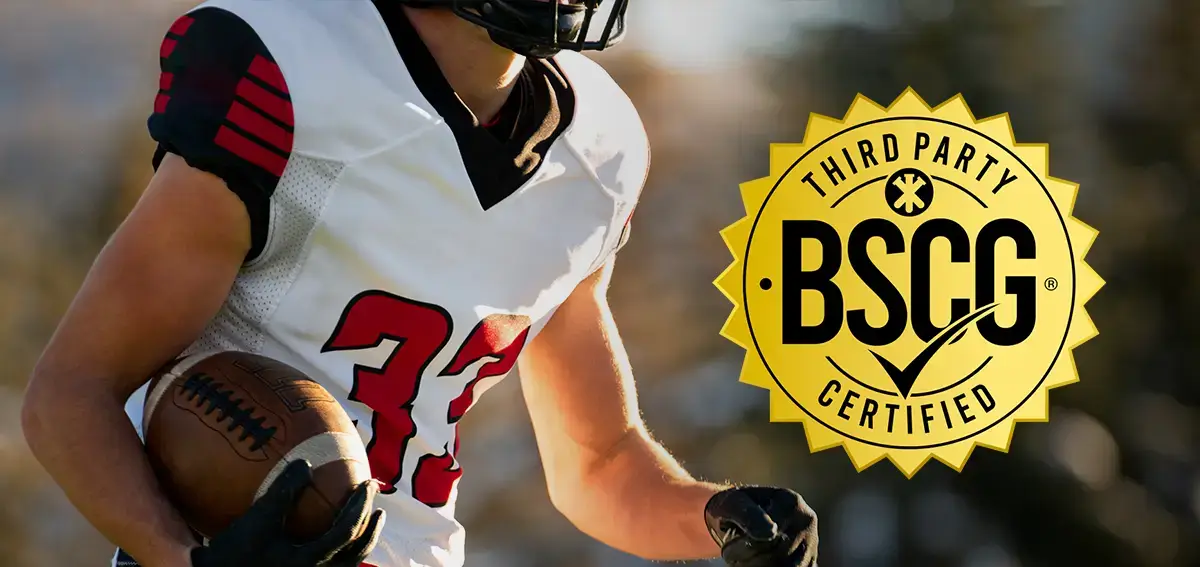
THE GOLD STANDARD IN THIRD-PARTY CERTIFICATION AND TESTING : +1-800-920-6605, info@bscg.org
Many elite athletes and fitness experts have many questions about sports doping and supplements. Sports Doping and Supplements usage overall have been skyrocketing since the 90s. Please take a moment to read our FAQ about Sports Doping and Supplements, and to better understand what we are all about.
Yes, BSCG has an official conflict of interest policy. Its purpose is to ensure that BSCG—and the persons who manage and control BSCG—are free of conflicts that could be perceived as affecting the impartiality and neutrality of BSCG and its testing and certification programs. This policy is intended to supplement but not replace any applicable state and federal laws governing conflicts of interest applicable to organizations like BSCG. View the policy here
Conflict of Interest PolicyBanned Substances Control Group or BSCG is an independent, third-party company specializing in certification of dietary supplements, natural products, functional foods, homeopathics, medical devices and more. The BSCG Certified Drug Free® program is a certification system that utilizes the most up-to-date scientific analysis and testing procedures to ensure that products are free of drugs or other contaminants that can be harmful or lead to positive drug tests. We also evaluate the general quality of products and check their label claims in our Certified Quality program and audit facilities for GMP compliance under our Certified GMP program. Created out of a need to protect human athletes, BSCG has broadened its focus to include protection of equines and canines as well as consumers at large. We have done this by addressing drugs outside the realm of sport that are a concern in the industry and are pleased to be the only supplement certification provider to offer this additional protection.
Supplement certification involves verifying the integrity and quality of dietary supplement products, ingredients, and the processes and procedures involved in processing or holding them. Some programs, like our BSCG Certified Drug Free® program, focus on protection against the risk of contamination with drugs that could be banned in sport or harmful. Other programs, like our BSCG Certified Quality™ program, focus on label verification and contaminant testing and product quality and integrity. The last type of supplement certification focuses on compliance with the process and procedures laid out in 21 CFR 111 Current Good Manufacturing Practice to ensure that the facilities involved in producing or handling supplement products or ingredients are in compliance, and is offered through our BSCG Certified GMP™ program.
The BSCG Certified Drug Free® program offers protection against drug contamination for athletes, consumers and animals with custom drug testing menus developed for each group. The BSCG Certified Quality™ program includes verification of nutritional markers according to label claims and contaminant testing, which covers heavy metals, pesticides, solvents, and microbiological agents. Our Certified GMP™ program provides on-site audits to verify compliance with 21 CFR Current Good Manufacturing Practices (GMP). BSCG certification programs can be applied to finished products, raw materials / ingredients, and manufacturing facilities. While differences exist based on the application of the program, the key elements remain the same with drug testing, ingredient or label verification testing, contamination testing and GMP audits.
Don Catlin, M.D., is a longtime leader in sports drug testing and is widely considered a father of the field. He built the first laboratory in the United States to conduct such testing, the UCLA Olympic Analytical Laboratory, and in over 25 years as its director, grew it into the largest performance-enhancing drug-testing lab in the world. In a seminal publication in 2000, he first called the scientific community’s attention to the problem of contaminated dietary supplements. Oliver Catlin, his son, joined Dr. Catlin in 2004 to continue and expand upon his father’s pursuits in drug testing and toxicology and has himself become a respected leader in the field. Today, as BSCG President, Oliver is intimately involved with everything from developing its testing menu to sharing its expertise with the industry at large to help it navigate tricky issues. Together the Catlins are co-founders of BSCG along with their longtime colleague, respected Los Angeles attorney Ryan Connolly.
The WADA prohibited substances list is often used as a model for other sporting groups or leagues when determining what should be banned. Focusing on the WADA list when developing a supplement certification testing menu ensures that drugs banned by other sporting programs and leagues are covered as well. WADA laboratories test for Olympic and professional sports worldwide. If supplements are causing positive drugs tests, the compounds responsible are represented in the WADA statistics on adverse results. BSCG has focused its menu development on compounds responsible for adverse results as we believe those to be the most relevant to supplement contamination. The compounds we cover were responsible for more than 96% of positive drug tests in sport worldwide over the last decade.
Testing at detection levels in the part per billion range is important for protecting athletes from traces of drugs that could be present and lead to a positive drug test. Minute amounts of drugs can be found on drug tests, even if the compound would have little or no activity in the body. BSCG is proud to offer the lowest detection levels in the industry.
ISO 17025 accreditation is a system of standards for testing and calibration laboratories that ensures methods and practices meet the most demanding criteria. Having a top laboratory that meets this standard is vital to ensuring the methodology and practices used are effective in their testing aims.
In order to navigate the complex grey areas between drugs in sport and dietary supplements it is essential to have in-depth knowledge of how the prohibited sport list and associated thresholds are interpreted and applied. Often new supplement ingredients can have a potential to be banned in sport; some of these ingredients may appear to be legitimate and require deep experience to resolve. There are also naturally present hormones like IGF-1 that are found in whey protein, colostrum, and even deer antler. Evaluating whether that natural presence is a concern or not takes not just integrity but experience.
BSCG leadership has more than four decades of experience testing for banned substances in sport and dealing with associated toxicology issues and supplement concerns. From exposing the first designer steroid in sport (norbolethone) to doing the pioneering analytic work and first tests for artificial testosterone, the long-acting stimulant darbepoetin and the designer steroid behind BALCO (THG), we have developed some of the most advanced scientific techniques in the world for testing for banned substances in sport in athletes and in supplements. We have the experience and know-how necessary to identify and to make the correct interpretations on difficult ingredients and to ensure that our testing technology is not only innovative but effective.
Supplement testing is not easy. You are dealing with a variety of different matrices and ingredients that can affect analyses in different ways. The science has to be done right in order to get effective results. Many labs might be able to test for drugs but to do so effectively in dietary supplements is something few labs are equipped and trained to do.
21 C.F.R. 111 – Good Manufacturing Practices (GMP) are a set of guidelines that the FDA put together to govern the manufacturing of food and/or dietary supplements. They cover areas such as personnel, sanitation, storage, the manufacturing process and tracking, quality standards, quality control and adverse event tracking. Only in the last decade did it become mandatory for all supplement manufacturers to make products according to GMP. While this requirement has improved quality overall, it does not ensure quality in products as the guidelines are weak and vague in certain areas, especially in regards to ingredient specifications, finished product specifications and contaminant testing.
The easiest way for an athlete to ensure a dietary supplement is safe and appropriate is to make sure the lot being used has been certified to be drug free by a reputable third-party organization such as BSCG. This takes the guess work out and an athlete can rest assured that the product has been completely reviewed and tested for banned substances in sport. That is the single best way to protect against drug-testing risk. We also encourage athletes to spend time reviewing and researching the products they wish to use and learning the science behind them. For questions, athletes may call BSCG at 800-920-6605 or join our Athlete Assurance Program, the only program in the industry tailored for individual athletes and teams.
Consumers at large should be aware of the potential for drugs to infiltrate their products as this is happening more and more across the spectrum of sports nutrition products and general consumer products. In the consumer realm, weight loss supplements, joint products, sleep aids and sexual enhancement products have seen growing a growing trend of drug contamination. Even seemingly natural products or herbs can contain compounds that can be a problem. Inaccuracy of labels can also be an issue if consumers are getting less or more of a nutrient or element than expected. Consumers should look for products that have been tested by a third party to ensure their quality and verify that unwanted drugs are not present.
Equines and canines also face contamination concerns from feed, compounded veterinary drugs and a growing number of animal supplements. Competition animals like thoroughbreds or greyhounds are also subject to drug-testing rules that include more than 1,000 drugs. A tragic example came a few years ago in Florida where a polo team had a local pharmacy compound a supplement. The recipe was not followed correctly and a dangerously high level of selenium was put in the supplement, resulting in the death of more than half the horses on the field. Making sure that what an animal ingests has been tested to ensure quality and safety can help protect their health and their lives.
Getting their products certified gives manufacturers the peace of mind to know that their products are reputable and of the highest level of quality. Having a respected third party attest to this and allow their seal on a product tells consumers that the product is safe and not hiding something that might be detrimental. Supplement companies who certify consistently tell us they are glad they did, as it has helped to establish goodwill with their consumers and build their businesses. Indeed, consumers of certified supplement products are more likely to see these supplement companies as concerned about protecting them and serious about delivering quality products. Proactive certification also verifies that quality is met on a regular basis, providing insurance against the occurrence of costly quality issues arising through government inspections or other testing.



 YouTube Channel
YouTube Channel
Oliver Catlin Interview
 BSCG BLOG
BSCG BLOG
Tainted Supplements Still Causing NFL Doping Violations

 The Catlin Perspective blog widget
The Catlin Perspective blog widget
THE HISTORY OF BSCG